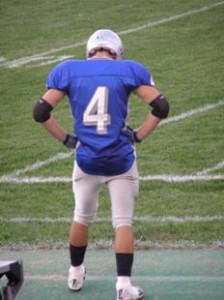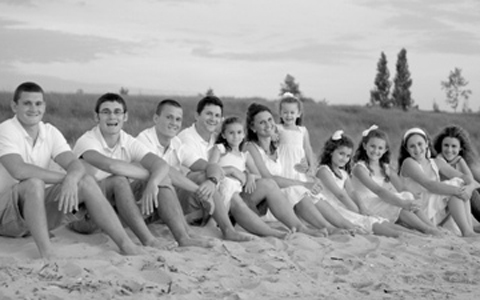 Ever since Mike was a little boy he wanted to play football. When he was five he slept with footballs. He refused to take off his shoes for bed, and when his dad or mom insisted that the shoes come off, he slept with them clutched to his side in, of course, a football hold. When it was time to choose wallpaper I’m sure you can guess what kind Mike wanted…that which depicted the gridiron. He and his brother did not choose wallpaper with mere footballs, but that which showed quarterbacks in varying poses, running with or throwing the ball, for that’s what he wanted to be- a quarterback. When his dad put the wallpaper up, Mike didn’t want to leave the room.
Ever since Mike was a little boy he wanted to play football. When he was five he slept with footballs. He refused to take off his shoes for bed, and when his dad or mom insisted that the shoes come off, he slept with them clutched to his side in, of course, a football hold. When it was time to choose wallpaper I’m sure you can guess what kind Mike wanted…that which depicted the gridiron. He and his brother did not choose wallpaper with mere footballs, but that which showed quarterbacks in varying poses, running with or throwing the ball, for that’s what he wanted to be- a quarterback. When his dad put the wallpaper up, Mike didn’t want to leave the room.
While other boys wanted to be Power Rangers in colorful suits or superheroes with a cape, Mike just wanted black reflective tape under his eyes and a jersey, any color. And while many little boys may have dreamed of having the ball, Michael actually had an aptitude for it. He tossed it, ran with it, and athletically tumbled and rolled when he was “down”. When he was taken outside in the backyard of his parent’s first home, he would clutch his pigskin, pretend he was quarterback and just run. In fact, his mother strong-armed her husband into buying a fence for the yard because Mike ran so much with his little brown football she was afraid he would dash into the street and get hit by a car.
First Mike played organized flag football at the YMCA, then *real* football on a Catholic school team. As quarterback of his high school freshman team Mike and his teammates were undefeated. His sophomore year he started as junior varsity quarterback and led the team to an 8-1 record. As quarterback his junior year the team again won all games but one.
The summer before Mike’s senior year he competed for the quarterback position on the varsity squad with another athlete. Much to his disappointment, he did not win the position. He was, however, offered the “opportunity” to play the starting varsity safety position on defense. Mike did not initially see this as an “opportunity.”
This was Mike’s senior year, and he had looked forward for four years, actually for his entire life, to playing as the starting quarterback for the varsity team. He had literally drifted off to sleep, night after night, surrounded by that dream. Now it was not going to happen. The position call was not Mike’s decision, but the coach sought Mike’s cooperation. What would Mike do? Oblige with a positive attitude? Fight it? Bad-mouth the coach? Call it bad luck? Storm off the team? Mike took a deep breath and told the coach, “Whatever you need.”
But that’s not the end of the story. Mike didn’t just do what he was told and suffer through the season, a sort of athletic martyr. He didn’t just resign to being a safety and plod on with a grumble. No, he threw himself 100% into his new responsibility. He practiced hard. He gave extra effort. He put up with another guy in the position he always dreamed of. He didn’t hold grudges. He concentrated on his task, his job in each game. And an amazing thing started to happen. As the season progressed, Mike started racking up tackles like he had previously thrown passes. He excelled. He even got to play quarterback a few times. In the end, he was named First-Team All-Conference, earned a position on the All Diocese Team, received several awards for football excellence, and was recruited by colleges for football. He received recognition for skill and excellence in the safety position he initially never wanted. Imagine that. Changing mid-course- adapting to an unforeseen circumstance – provided an opportunity which resulted in success.
Being able to adapt to change is important. Business articles laud the benefits of adjusting to economic change. Agricultural specialists realize the value of adapting to weather change. And every wise money manager working on a budget knows that the key to financial success is to adapt to fiscal change that may present itself. Psychiatrists tell us that the ability to adapt to change and cope with adversity enhances our mental health. In fact, there is a positive correlation between the impact of one’s mental health and chronic disease, so our physical conditions actually rely on our ability to adjust. And yet, so many of us have difficulty with the idea of changing course, even when we have no choice.
How many times do we hope for a certain outcome and refuse to change midstream when something collides with our goals? “I deserve it” “I earned it” “This is my dream. I’m not giving it up.” We may tell ourselves these things over and over, admittedly sometimes without looking at the cause of a higher good, without looking to what may be best for our family, the team, society, to what might just be God’s will. An irony, however, is that often when we are willing to adjust, the family, the team, and society are not the only winners. Frequently we are too.
In looking back at the example of the football player Mike, some might say, “What’s the big deal? The kid didn’t get the position he wanted. It happens all the time.” And the truth is that’s absolutely right. But what does not happen all the time is someone accepting reality with class and grace, someone adapting with a positive attitude, someone accepting present circumstances as God’s will, which Mike did. Not a big deal, but an important one. And the twist, of course, is that Mike benefitted in the end. And why not? God is full of surprises. He always wants to put us in a good position.
“We must unite ourselves to God’s will not only in things that come to us directly from his hands… but likewise in those … from man…From God come all things.”
–St. Alphonsus Maria de Liguori
From “Uniformity with God’s Will”
We value your comments and encourage you to leave your thoughts below. Please share this article with others in your network. Thank you! The Editors.












